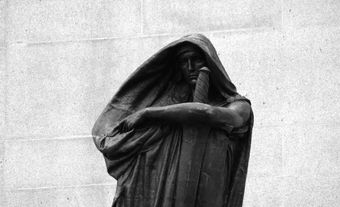This article was originally published in Maclean's Magazine on May 16, 2005
Gomery Inquiry Learns Illicit Cash Flowing for Years
SOMETIMES the testimony at the Gomery commission starts to run together in your head, and the significance of it isn't obvious until you pause and give your head a shake. I had one such light-bulb moment when Michel Béliveau, a former LIBERAL PARTY official in Quebec, testified late last week.
Most of the reporters covering Gomery have been waiting for the arrival of Beno"t Corbeil, who ran the Liberal party's Quebec wing during the 2000 election and who has been so good as to preview his testimony in a round of media interviews. Corbeil has said he received $50,000 from the Groupaction ad firm to pay Liberal workers under the table during that 2000 campaign.
Sure enough, Gomery heard last week from a succession of these "fake volunteers" - long-serving, small-time Liberal political staffers, in the main. They found themselves facing a cash crunch for various reasons before they landed campaign jobs during the 2000 election. And they didn't ask many questions about why they were told to bill some company called "Commando Communications Marketing" for "consulting services rendered" instead of the Liberal Party of Canada for election work.
So Corbeil's version of events, before he even took the stand, was starting to accrue some surface plausibility. Then along comes Michel Béliveau, a stooped and ingratiating man who spoke softly and whose speech was dotted with reflexive use of the word disons - roughly, "y'know" - as he tried to explain how rather impressive sums of cash wound up shuttling back and forth across the Liberals' Quebec wing during an election year.
Another brick in the wall of Corbeil's credibility, I thought briefly. And then I realized that Béliveau was talking about the 1997 election, not Corbeil's 2000 election.
The $300,000 or so in $20 and $100 bills that Béliveau either received from Jacques Corriveau, or heard that other Liberal organizers had received from that well-connected Liberal graphic designer, paid for an entirely different set of under-the-table services than Corbeil has described.
So it was all very good of Béliveau to fall on his sword - "It was me and no one else," he told Gomery. "I'm taking the responsibility." The fact remains that the techniques he described lived on after he had left his party post.
So far, the testimony Gomery has heard suggests that ad firms received far more money from the sponsorship program than the Liberal party received, in envelopes bulging with cash, from ad firms. Jacques Corriveau alone pocketed about $8 million in sponsorship subcontracts, yet Béliveau acknowledged less than a third of a million in kickbacks. So if the sponsorship program was designed from the outset as a clandestine source of Liberal party financing, it seems to have been wildly inefficient.
But the picture that does emerge is hardly more edifying. Two generations of Liberal leadership in Quebec knew that whenever an election rolled around they could count on a few party hangers-on who'd got rich on the taxpayer dime. And Chuck Guité, the federal bureaucrat who'd done so much to make them rich, started drinking from the same firehose of taxpayer dollars the day after he retired from what is still quaintly referred to as the "public service."
From 1997 to 2001, Guité and his successor Pierre Tremblay, now deceased, paid more than $100 million in production fees and commissions to firms run by men who have since entered the Gomery hit parade - Paul Coffin, Jean Brault, Gilles-André Gosselin, Jean Lafleur, Claude Boulay and others. Guité retired on Aug. 31, 1999. The next day he created Oro Communications, from the Spanish word for "gold."
Over the next three years he was paid more than $1 million from many of the same firms for work that often bore remarkably little fruit. He got $127,731 from Groupaction, for instance, to look for a potential buyer for that firm. He didn't find one. From Communication Coffin, $20,600 to find private sponsors for Grand Prix car races. He didn't find any.
The Chuck Guité who made a return appearance before Gomery last week is, therefore, a late arrival to the ranks of the contrite. In earlier appearances he portrayed himself as the decision-maker who ensured the program's smooth operation, all in the name of national unity. The second and third elements of that line of argument have since been roughed up a bit - the program wasn't smooth and we're not particularly united. So Guité abandoned the first element. Turns out he wasn't making the decisions after all.
"The government in power will design the policy to arrive to its end," he told Gomery, explaining how the newly elected Liberals changed the rules of government communications policy so that simply following those rules would ensure that Liberal-associated firms got the contracts.
So it wasn't Guité's decision, but that of Jean Pelletier and Jean Carle in Jean CHRÉTIEN's Prime Minister's Office, to spend $9 million on a TV program about Canada that was broadcast only in China. "There are not too many sovereigntists in China," Gomery remarked.
It wasn't Guité's decision, but that of Alfonso Gagliano, that a plaque should be installed at taxpayer expense in Gagliano's native Italy. The minister left "specific instructions to make sure there are no [paper] trails," Guité said. It was "pas trop catholique" - not quite cricket - but Guité did as he was told.
The picture that emerges from all this lies somewhere between the worst case the Liberals' political opponents have been making - a systematic machine of party-wide corruption - and the minimal case the Liberals have tried to advance. Guité's one attempt to rope Paul MARTIN into all of this was spectacularly rickety: he claimed to have heard from Tremblay that Tremblay had heard from Gagliano that Gagliano had discussed Vickers & Benson contracts with Martin. Triple hearsay featuring, as a sort of bonus, a dead guy and the former ambassador to Denmark.
But the idea that Adscam was the work of a few isolated rogues is also hard to sustain. When Béliveau leaves the party executive and his successor knows precisely whom to tap for envelopes of cash, it suggests a shared culture. When a bunch of fake volunteers settle in at Liberal headquarters after billing a company they don't know for work they aren't doing, it is hard to remain naive about how they all just happened to know the script. The nasty business Gomery is investigating cannot be confined to a single election or a single clique. It was closer to a way of life.
See also CORRUPTION.
Maclean's May 16, 2005

 Share on Facebook
Share on Facebook Share on X
Share on X Share by Email
Share by Email Share on Google Classroom
Share on Google Classroom


